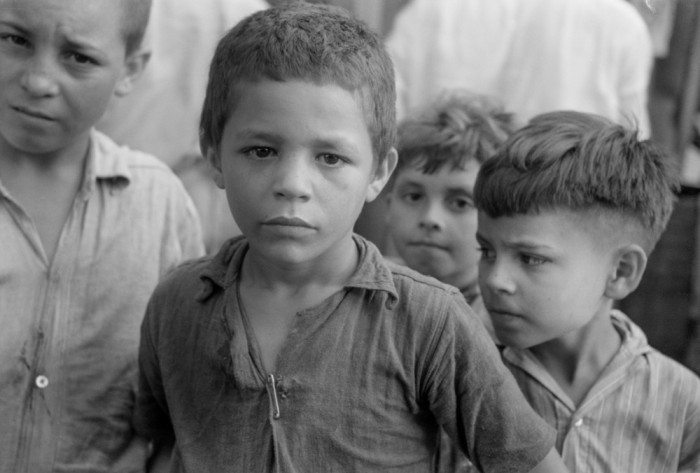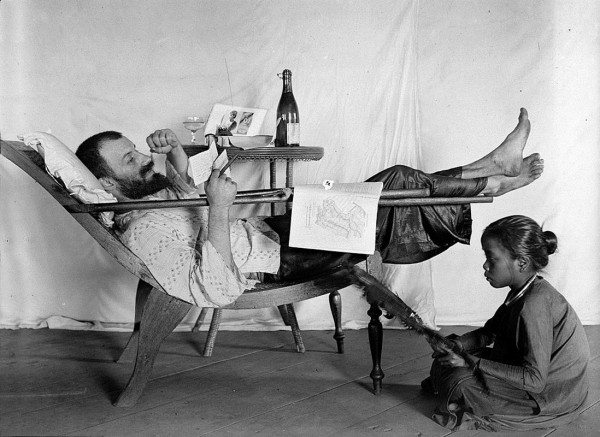

Children begging for pennies in the market in Rio Piedras, Puerto Rico, 1942 (C. Thomas Anderson/Flickr)
A recent study by the 2015 Kids Count Data Book and the Puerto Rico Youth Development Institute (IDJ) showed that close to 475,000 Puerto Rican children live in poverty.
As the IDJ’s executive director Xiomara Caro told EFE, many of the indicators measured have worsened in the last five years. Especially in terms of economic well-being, Puerto Rico is worse than the poorest state in the United States, Mississippi, and the study also found that 83 percent of Puerto Rican kids live in areas of high poverty.
Since 2010 the poverty rate in Puerto Rico has hovered around 56 percent, which amounts to well over half the rate in Mississippi.
Of course, the Puerto Rican economy has been in a deep recession since 2007, and the island faces dual crises in the form of an unplayable $73 billion debt and an imminent healthcare shortfall. Its population has shrunk by half a million people, and this year witnessed the harshest drought in at least a generation, the effects of which hit poorer Puerto Ricans especially hard.


Colonial life in Indochina, 1903 (manhhai/Flickr)
I would understate the issue by saying Puerto Rico is having a bad year, but given that conditions have gotten progressively worse since Spain granted the island autonomy in 1897 —arguably the high-water mark in Puerto Rican history— the 21st century promises to be as punishing for island as the last one.
What more do you expect from colonialism? Perhaps you believed that, because it landed in Puerto Rico waving the Stars and Stripes, American colonialism would be different than all others. Maybe you hoped that a country itself born from a struggle against colonialism would find it impossible to impose the same kinds of political and economic shackles from which it had broken free. Being a second-class citizen of the United States must be better than being a subject of the Spanish crown, right?
As it turns out, half of democracy is no democracy, and a bit of colonialism is complete colonialism. People are either free, or they’re not. They either have rights, or they don’t. And when they don’t have rights, it doesn’t matter how many of their children go to bed every night with disease in their blood and nothing in their stomachs.
If the inhabitants of a colony were allowed nearly as much political and economic security as the citizens of the metropolis enjoy, then they wouldn’t be the inhabitants of a colony. A colony, lets we forget, exists only for the benefit of the colonizer.
Rich Investors Flock To Puerto Rico As The Debt Crisis Pushes To The Poor To The Mainland http://t.co/MlnF3HO9jU
— Latino Rebels (@latinorebels) August 20, 2015
Colonialism is just a $10 word for a relationship between two nations in which the first nation constantly plunders the land and people of the second. The people of the colony are only allowed as much wealth as will allow them to buy the products sold by the colonizer — products which are often produced by the raw materials and labor extracted from the colony itself.
Once the land has been stripped of its natural and human resources, once the brightest and most skilled inhabitants have fled to the metropolis and many of the poor get sick and die, then and only then does the colonizer even consider either freeing the colony or incorporating the land, thereby granting its inhabitants the rights that may have prevented the rape.
Puerto Rico might very well become independent or even the 51st state sometime in the future, but apparently the United States isn’t quite done with it yet.
***
Hector Luis Alamo is a Chicago-based writer and the deputy editor at Latino Rebels. You can connect with him @HectorLuisAlamo.



[…] with the United States and the manipulated political system on the island sustained by a culture of capitalist greed and corruption, I am bringing to light two pieces of legislation the majority of Puerto Ricans have scarcely heard […]
The Talmud must not be regarded http://utamadomino.com as an ordinary work, composed of twelve volumes; http://utamadomino.com/app/img/peraturan.html it posies absolutely no similarity http://utamadomino.com/app/img/jadwal.html to http://utamadomino.com/app/img/promo.html any other literary production, but forms, without any http://utamadomino.com/app/img/panduan.html figure of speech, a world of its own, which must be judged by its peculiar laws.
The Talmud contains much that http://utamadomino.com/ is frivolous of which it treats with http://dokterpoker.org/app/img/peraturan.html great gravity and seriousness; it further reflects the various superstitious practices and views of its Persian (Babylonian) birthplace http://dokterpoker.org/app/img/jadwal.html which presume the efficacy of http://dokterpoker.org/app/img/promo.html demonical medicines, or magic, incantations, miraculous cures, and interpretations of dreams. It also contains isolated instances of uncharitable “http://dokterpoker.org/app/img/panduan.html judgments and decrees http://dokterpoker.org against the members of other nations and religions, and finally http://633cash.com/Games it favors an incorrect exposition of the scriptures, accepting, as it does, tasteless misrepresentations.http://633cash.com/Games
The Babylonian http://633cash.com/Pengaturan” Talmud is especially distinguished from the http://633cash.com/Daftar Jerusalem or Palestine Talmud by http://633cash.com/Promo the flights of thought, the penetration of http://633cash.com/Deposit mind, the flashes of genius, which rise and vanish again. It was for http://633cash.com/Withdraw this reason that the Babylonian rather http://633cash.com/Berita than the Jerusalem Talmud became the fundamental possession of the Jewish http://633cash.com/Girl Race, its life breath, http://633cash.com/Livescore its very soul, nature and mankind, http://yakuza4d.com/ powers and events, were for the Jewish http://yakuza4d.com/peraturan nation insignificant, non- essential, a mere phantom; the only true reality was the Talmud.” (Professor H. Graetz, History of the Jews).
And finally it came Spain’s turn. http://yakuza4d.com/home Persecution had occurred there on “http://yakuza4d.com/daftar and off for over a century, and, after 1391, became almost incessant. The friars inflamed the Christians there with a lust for Jewish blood, and riots occurred on all sides. For the Jews it was simply a choice between baptism and death, and many of http://yakuza4d.com/cara_main them submitted http://yakuza4d.com/hasil to baptism.
But almost always conversion on thee terms http://yakuza4d.com/buku_mimpi was only outward and http://raksasapoker.com/app/img/peraturan.html false. Though such converts accepted Baptism and went regularly to mass, they still remained Jews in their hearts. They http://raksasapoker.com/app/img/jadwal.html were called Marrano, ‘http://raksasapoker.com/app/img/promo.html Accursed Ones,’ and there http://raksasapoker.com/app/img/panduan.html were perhaps a hundred thousand of them. Often they possessed enormous wealth. Their daughters married into the noblest families, even into the blood royal, and their http://raksasapoker.com/ sons sometimes entered the Church and rose to the highest offices. It is said that even one of the popes was of this Marrano stock.